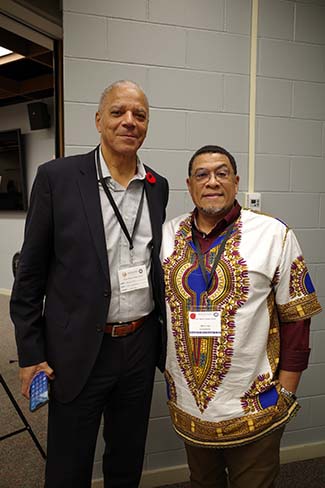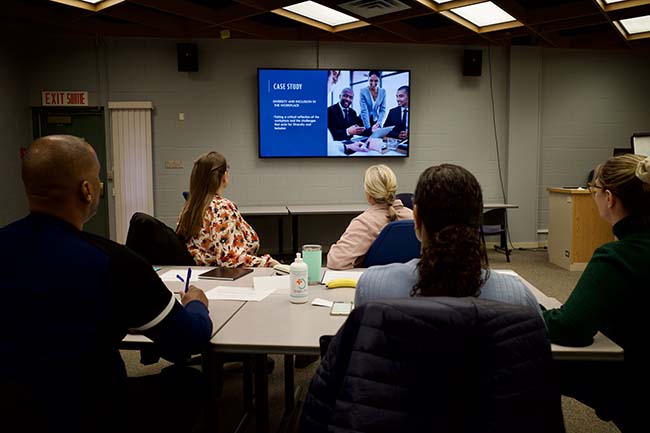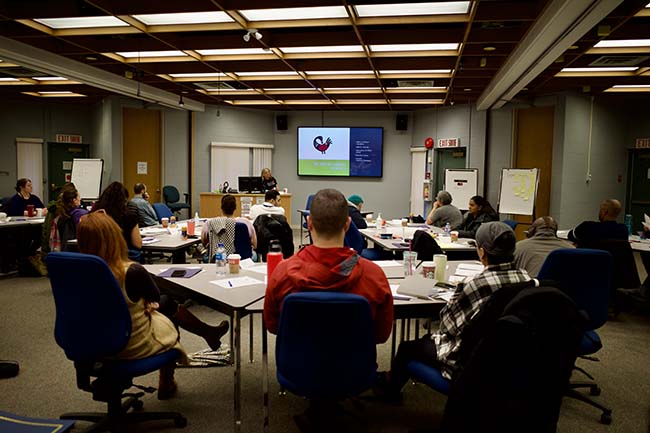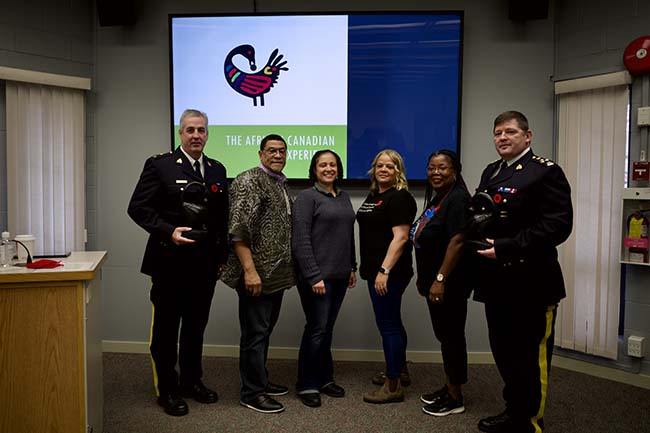BC RCMP hosts the African Canadian Experience (ACE) Workshop
B.C.
2024-02-22 12:04 PST
In November 2023, the BC RCMP hosted the African Canadian Experience (ACE) Workshop, at its Pacific Region Training Centre (PRTC). This five-day, in-person interactive workshop was attended by 27 employees of varying categories and levels of service within the BC RCMP.
This was the first time the ACE Workshop was delivered in British Columbia. The delivery was arranged by Inspector Veronica Fox, the Executive Officer of the BC RCMP Commanding Officer who had previously attended an offering in Nova Scotia.
The Workshop, facilitated by Sergeant Craig Smith, PSE Dana Colley-Provo and PSE Shelley Braithwaite, highlighted some of the rich and complex history of Black and African Canadians. Topics covered areas not traditionally included in the public-school curriculum including the Black community’s arrival in the 18th Century, cultural diversity, as well as unique obstacles faced and contributions made to Canada. As well, the relationship between the police and Black Canadians was contextualized, providing attendees a framework in which to understand and to improve relationships moving forward.
Workshop Origins

In 2008, Sergeant Craig Smith developed the African Nova Scotian Experience Workshop for RCMP employees in Nova Scotia. The workshop provided participants with cultural awareness, skills, and tools to draw on when policing and working in distinctive African Nova Scotian Communities.
In 2017, Sergeant Smith, alongside Corporal Adam Jackson, Constable Natasha Dantiste, PSE Colley-Provo, PSE Braithwaite and Mr. Robert Upshaw expanded the content, establishing the first iteration of the RCMP’s African Canadian Experience (ACE) Workshop.
Since inception, the ACE Workshop has been delivered to countless RCMP employees, as well as multiple external government organizations. In 2021, it was rated a Best Practice by Parliament in the Annual Report on the Operation of the Canadian Multiculturalism Act.
Looking Back Through Time
The ACE Workshop begins with a review of the struggles and contributions of Black and African Canadians, through history. This starts with the first recorded accounts of Black persons in Canada, including those of Mathieu Da Costa, who arrived in 1605 into occupied Mi’kma’ki territory (present day Nova Scotia), and Olivier Le Juenune, an enslaved African from Madagascar, in 1628.
From there, various contributions of Black Canadians over the centuries are explored, including that of Rose Fortune, who is recognised as an entrepreneur and the first known Black woman in law enforcement in North America. Around 1825, Fortune was unofficially keeping the peace on the Annapolis Royal wharf in Nova Scotia, de-escalating issues and enforcing local bylaws. Fortune was recognized in 2019 by Canada as a person of national significance.

Amongst the first contributions to sports is George Dixon of Nova Scotia who in 1890 became the world boxing champion and was elected into the Canadian Boxing Hall of Fame in 1956. The story of the Colored Hockey League (CHL), an all-Black men’s league formed in 1895, is also shared.
The contributions of Black Canadians during the First and Second World Wars are addressed. Although Black Canadian men were initially barred from loyally serving their country during WWI, over 1,500 from across Canada and the United States were eventually able to join the Canadian military, and through letters of protest and community advocacy, on July 5, 1916 the segregated No. 2 Construction Battalion (the Black Battalion
) was formed as an Expeditionary Force in Pictou, Nova Scotia.
Policing Contextualized
The first contributions of Black Canadians into the RCMP was also explored. Although there is documentary evidence that Black Canadians were not always welcome to join the RCMP, members of the community were persistent, and in 1967, Constable David Harding from Calgary, Alberta became the first Black Regular Member to join the Force. In 1982, Constable Shelley Peters became the first Black Canadian female member to join the RCMP. Her father, Walter Peters, had been a member of the Canadian military and held the distinction of being Canada’s first Black jet fighter pilot in 1963.

Supported by historical literature and testimonials from Black Canadians the ACE Workshop explores segregationist policies and practices such as community expropriation, forcible displacement, and environmental racism against Black Canadian communities, with a particular focus on Nova Scotia, Prince Edward Island, and British Columbia. The workshop provided a case study of the Nova Scotia School Home for Colored Children and the inter-generational harm it and other government policies have caused to the Black Canadian community.
As the ACE Workshop addresses: The evolution of segregationist socio-economic, health and environmental practices into policies and laws in Canada has been a contributor to the Black Canadian community’s experiences in interactions with police. The Workshop focussed having attendees think critically about their roles within the organization, and the opportunities available to them to champion impartiality and equitable justice.
Continuing the Dialogue Now and in the Future

The ACE Workshop included an employee panel where PSE Shelly Braithwaite, Inspector Fox, and E Division’s Superintendent Tom Jones (retired) led a dialogue about their experiences as Black Canadians in the community, and as employees within the RCMP. The theme that emerged was that all members of the RCMP, despite category, level, or rank, have an opportunity to better understand Canadian history, the organization’s role within it, and to recognize the ways in which they can become impartial and equitable champions for justice.
Speaking of her experience having previously attended the Workshop, Inspector Fox said, The ACE Workshop was a life-changing experience for me. I learned history I did not know, and gained some new perspectives on the Black Canadian community’s relationship with the police. I am very pleased to be able to share that positive experience with fellow employees in BC. African Tradition tells us that there is value in exploring our past to inform our forward momentum now and in the future. This concept is called ‘Sankofa,’ and it very much embodies for me what this Workshop offers.
Released by:
BC RCMP Communications Services
778-290-2929
Follow Us:
- Date modified: